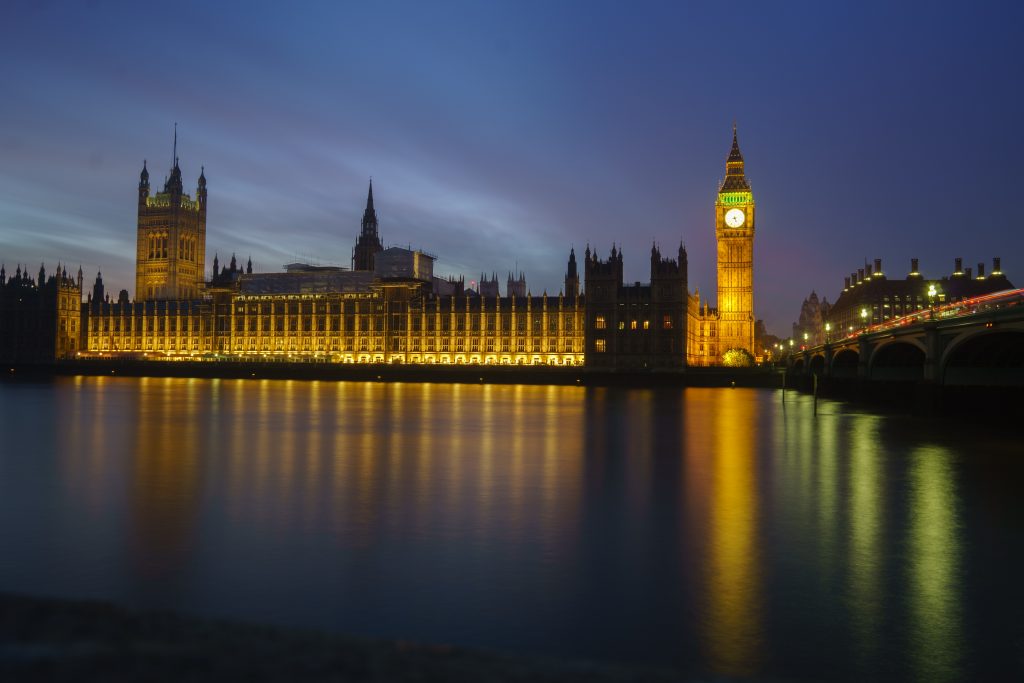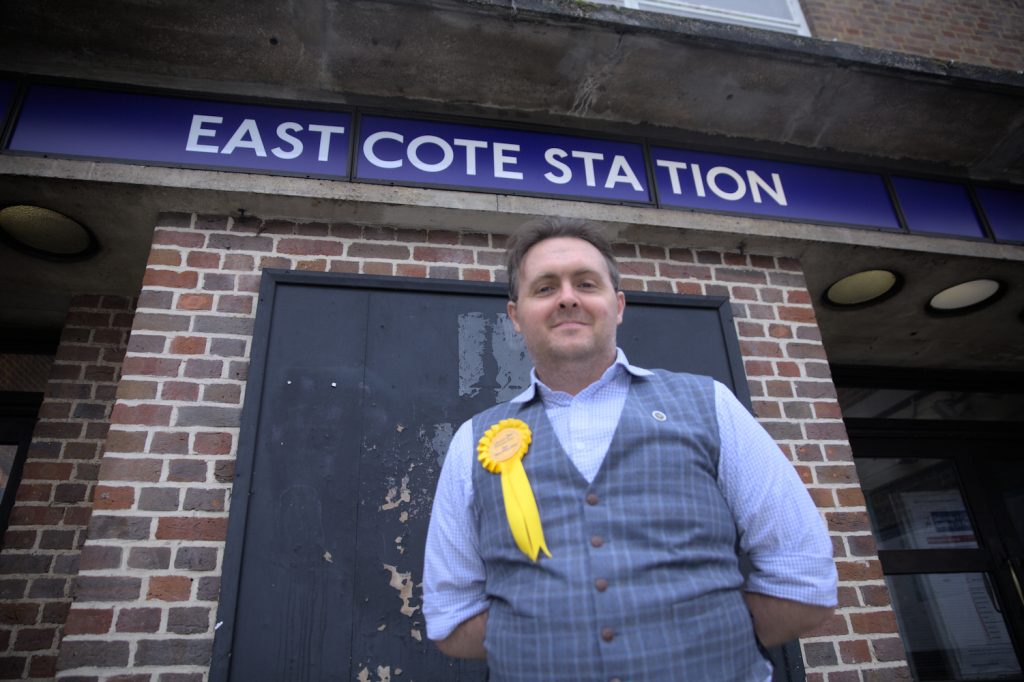Steve Tuckwell – Conservative

In 2023, Boris Johnson was forced to resign in disgrace as MP for Uxbridge & South Ruislip following the investigation into his repeated lies to Parliament over Partygate. In the wake of that, a by-election was triggered in Uxbridge & South Ruislip, which ultimately resulted in Steve Tuckwell being returned as MP with a margin of only 500 or so votes (with a total cast for Tuckwell of just under 14,000). So who is Steve Tuckwell, what did he run his campaign on, and what has he done so far? This analysis will attempt to show that he is wholly unsuitable to be Uxbridge & South Ruislip’s MP, and why. This isn’t just going to be a political hit piece from an opponent, this is going to be a deep dive into Tuckwell’s political history and will include sources for any claims or comments that are relevant. Image from Wikipedia. Early Career There’s nothing particularly noteworthy about Steve Tuckwell’s career. He was a manager for Royal Mail and worked for a vehicle leasing company. Nothing that screams that he would be good or bad for the role of elected representative. I have not heard of any skeletons coming from any aspect of his career, but neither have I heard anything particularly positive that makes it seem like he was suitable for a career in politics. Political Activity In 2018, Steve Tuckwell joined Hillingdon Council as a councillor, standing as a Conservative candidate. As such, Tuckwell has been involved with the Council for five years at the time of writing, and as a senior person within the local party, it is fair to say that he had influence over most things that happened in Hillingdon. So what has he achieved? Looking at the Hillingdon Council website, it is pretty unclear. According to that, Tuckwell has only voted on 24 issues in that five-year period, so I think it is fair to say that his contributions were not prolific. Setting that aside for a moment, let’s consider what Hillingdon has achieved recently. Luckily I put together a list of the increased costs and charges some time ago, during a time when Tuckwell was a councillor but not yet an MP. These cost increases are indicative of a council in financial trouble, and since the council itself and the national government have both been Conservative for over a decade, there’s no-one else to blame. By-Election Campaign I was fortunate enough to enjoy a front-row seat to the Uxbridge by-election, as I was heavily involved in assisting my predecessor Blaise Baquiche with his campaign. Unfortunately, we weren’t successful, but we did learn some lessons and stocked up some ammunition for the next campaign – this one. In short, Steve Tuckwell ran his campaign on three points, namely: That he was already an experienced councillor and that Hillingdon was doing well (it wasn’t). That he would cancel the ULEZ expansion in Hillingdon (he couldn’t). That he would reopen Uxbridge Police Station (he hasn’t). Many of his campaigning issues stem from the fact that he made promises he had no way of achieving. MPs have no power over ULEZ, as that is a devolved power of the Greater London Assembly. His Conservative mayoral candidate colleague, Susan Hall, could probably have explained that to him, assuming she was able to recover from her entirely fictitious pickpocketing incident. I imagine I will be covering Susan Hall more in future blog posts, but suffice it to say, she’s ludicrously unqualified for any position of responsibility, let alone Mayor of a city the size of London. Likewise the status of Uxbridge police station is under the purview of the London Metropolitan Police, which itself is under the auspices of the Mayor. As such, Tuckwell’s entire campaign was based on lies. He has no more power as an MP to stop ULEZ expansions or to reopen Uxbridge police station than he had as a normal person. Arguably he actually had more power as just a councillor than an average MP would have. He had no business standing as an MP candidate if he knew that his promises were not just unlikely but outright impossible to achieve. He might as well have promised all voters in Uxbridge £1 million for all the realism it offered. It might sound nice to think about receiving such a largess, but it’s simply not going to happen. It’s fair to say that this on its own could be considered biased reporting about a political opponent, and it is much harder to attack someone’s campaign pledges during their campaign itself. So let’s look at what he has actually done since getting elected. Parliamentary Record Once someone gets into Parliament, their voting record becomes a matter of public interest. Hansard reports on everything that a member says in the debate chamber and every vote they participate in, including their actual stance on the matter. There are many aggregation tools which summarise this voting record, but the one I have used is Public Whip. The first noteworthy statistic is the number of rebellions. This indicates the number of times an MP has disagreed with what their party has decided. That figure? Zero. Not once in (at the time of writing) 79 votes. That means that he has voted for: Rwanda to be declared a safe nation in spite of all evidence to the contrary. Restrictions on the actions of trade unions, removing worker rights. Hiding the school safety report from public access, meaning parents around the country had no information on whether their children were attending a deathtrap. Criminalising nitrous oxide at a time when the prisons are over capacity. Voting against the expansion of the Electoral Commission’s role in combating electoral fraud. A 4% reduction in capital gains tax for landlords. Reducing the asylum and immigration budget without a credible plan for saving money. In short, he has voted exactly as Rishi Sunak tells him every single time. He has not voted in the interests of the
The Good, the Bad and the Ugly of UK Politics

It’s quite a rarity to be able to say this, but next Christmas is now 366 days away because next year is, as far as I can tell, a leap year. Next year will also most likely see a General Election, unless Rishi Sunak decides for some bizarre reason to have an election campaign over Christmas. Barring the more minority parties, the current system for voting means that people realistically have a choice of Conservative (currently Steve Tuckwell in Uxbridge & South Ruislip), Labour or Liberal Democrats. Scientists are hard at work as we speak trying to determine whether 2024 will be a leap year. Here’s why you should vote Liberal Democrat, and perhaps more importantly, why you shouldn’t vote Conservative or Labour. In this article, I am going to refer to the Good, the Bad and the Ugly, and if you fancy a bit of a challenge, you can try to predict which of those descriptors I apply to each of the major parties. The Ugly Just as a surprise for everyone, this is of course the Liberal Democrats. I kid, I kid, it’s obviously the Conservatives. Since coming to power 13 and a bit years ago, they have systematically made almost every aspect of life worse for UK voters. Schools are literally falling apart, doctors and nurses are regularly going on strike, inflation has been allowed to run rampant, and the Tories have spent their time focused on petty issues like the small boats “crisis” and London’s Ultra-Low Emissions Zone. When it comes to small boats, we are talking about 100,000 migrants arriving in the last five years, meaning around 20,000 a year compared to a population of around 70 million. To put the number in perspective, that’s around 0.03% of the UK population each year, which might as well be a rounding error. On top of that, of the 100,000 migrants arriving by small boat, some 92,000 of them submitted asylum applications, making them – by definition – asylum-seekers. In case you are wondering, that means they absolutely are not illegal migrants, but instead they are refugees with a legal right to be here until their application is reviewed and their case decided. In terms of the ULEZ, it is vital to remember two things, namely 1) that this was a Tory initiative introduced by Boris Johnson while he was Mayor of London, and 2) that MPs have absolutely no say or control over ULEZ, as this is a power deferred to the Greater London Assembly. As MP, Steve Tuckwell has no more power to influence ULEZ than literally any random member of public, therefore running his campaign on this basis was utterly despicable. I firmly believe that Uxbridge & South Ruislip have had enough of ugliness and will oust the Tories at the very next opportunity. The Bad In this category, I am going to put Labour. This isn’t for any specific policy at this time, as they have not yet released their formal manifesto for the next election. Rather it is for what they have already said they will do, or more specifically what they won’t do. As those of you who have read my blog previously will already know, I am a huge believer in the idea of Proportional Representation. At its heart, this is the principle that the amount of legislative power enjoyed by a party should be proportionate to the amount of votes they receive in an election. Hopefully this isn’t a particularly controversial statement, but the important thing to remember is that our current system doesn’t do this. Instead, votes cast for smaller parties are ignored, while votes cast for the largest party are magnified. This is why the Tories are currently enjoying 100% of the legislative power in Parliament despite only receiving 46% of the votes in the last election. So why am I talking about the Tories in a paragraph about Labour? The answer to that is in the position that Starmer and the Labour leadership have adopted, namely an opposition to Proportional Representation. Ultimately this means that it doesn’t matter what policies they have in the short- and medium-term, they are committed to handing absolute power back to the Tories at some point in future. This makes them part of the problem, not the solution. In my opinion, this is bad. The Good Without question, the Liberal Democrats are going to have some policies that you disagree with. Importantly, however, the main focus is on changing the electoral system so that your vote matters and your voice is heard. You can fundamentally disagree with me on everything else that I believe in, but I very much doubt that we disagree on the idea that you should have a say in who makes the law. Likewise, one of the objections I hear regularly is that switching to Proportional Representation will allow far right parties into Parliament. Unfortunately I think that objection is outdated – the far-right are already there, and our First Past The Post system helped them to get into power. We Liberal Democrats believe in a fair society for everyone rather than just the rich or just our supporters. As such, we will always fight for fair representation in parliament and fair treatment of everyone no matter their status of birth. To my mind, that makes us the Good in this analogy. We are clearly not the only good ones out there, but we are the largest truly progressive party, and unfortunately if we collectively want to see a more proportionate system of elections introduced, the progressive parties need to stand aside for one another. I’ll see you on the campaign trail next year. Come and talk to me if you want to discuss any of my points or my wider manifesto. Merry Christmas to those celebrating, and a Happy New Year.
5 Parliamentary Anachronisms

No, I am not doing an article bashing the Conservative Party, or at least not with that as the sole focus. Instead I wanted to cover some of the oddities of Parliament that stem from tradition rather than any reasoned process. As such, here are some of the weirder parliamentary anachronisms that we can see today. Minimalist Architecture In somewhere like the Palace of Westminster, it is hard to believe that the phrase “minimalist” could accurately apply to any part of the building. Nevertheless, the heart of our democracy, the debate chamber in the House of Commons, is woefully undersized. At the moment the UK has 650 elected Members of Parliament. Some of those do not take their seats, so the actual number of active MPs is a little below that, but the capacity of the debate chamber is well below that level, around 427 seats. This is why many of the well-attended debates see Members cramming into the chamber, with a significant number of elected officials reduced to standing to watch the proceedings. Oath of Allegiance I mentioned above that some seats are not filled at all. This is mostly due to the fact that the elected representatives of Sinn Fein do not take their seats, entirely because they will not swear the oath of allegiance. This is wholly understandable, as the oath is a personal declaration of intent to follow the orders of the monarch of the UK, while the whole purpose of Sinn Fein as a political entity is to separate Northern Ireland from the UK. Such an oath would directly contradict their party’s stance, so they refuse. Incidentally, it is not possible for an MP to either draw their salary or speak and vote in debates until they swear the oath, so that means that the current system specifically excludes representation for anti-monarchists. The Mace If you see a large ceremonial mace in front of the Speaker’s chair and wonder “what is that for?”, this is the section for you. This isn’t a table decoration or a paper weight, instead it is the symbol of the Crown in Parliament. By tradition, the monarch is not allowed to set foot in the House of Commons, so instead the Mace is present. Bizarrely, this means that any debates or decisions made without the Mace being present are not valid and will not be recorded in official proceedings. When Parliament is prorogued (brought to a temporary close) the Mace is removed, symbolically withdrawing the authority of the Commons to make any decisions. The Mace is returned at the Opening of Parliament. Member Behaviour One of the odder things about Parliamentary process is the way that MPs refer to one another. In short, naming another MP is taboo. Addressing another MP directly is likewise not permitted. Instead all comments are made to the Speaker and any referrals to active MPs is made by referencing their constituency (e.g. the Member for Uxbridge and South Ruislip). This is intended to increase the decorum of debate by stopping MPs from outright insulting one another, but I think it’s fair to conclude that Prime Minister’s Questions demonstrates that the quality of debate is woeful. Voting At the cry of “Division” by the Speaker, the Commons officially enters a closed state for voting for a motion. This is a literal reference, in that the lobby doors used to be physically locked to ensure that MPs didn’t vote multiple times or that outsiders weren’t called in to cast a vote they shouldn’t have. You might think that in this modern era of connectivity, there would be a move towards using that for votes so that more business could be done. Sadly not, the division is still counted by the MPs present physically walking through one of two side lobbies, casting their vote by tapping their membership card onto a scanner (a recent upgrade to each corridor having its own set of counters who would report back after a manual count). This is one of the more egregious anachronisms for various reasons. First, it is not particularly friendly to disabled MPs or those dealing with a new child to force them to physically move through a voting lobby. Secondly, it is grossly unfair to restrict MPs who cannot be in Westminster from voting. This is less of a problem for a London constituency as it is for one of the outer Scottish regions, which might be seven or eight hours away from Parliament. This is an area which could easily be modernised for the good of the country. A modern electronic voting system would be very simple to set up, and would reduce the time needed for divisions from 20 minutes or so to under a minute. With an app-based voting system and biometric protection, MPs would be able to cast their vote from anywhere in the world, allowing them to spend more time in their constituencies.
Ruislip Reshuffle

Reshuffles are hardly a rarity in politics. Sometimes there’s a really good reason for them, other times they baffle everyone observing the events. Hillingdon Liberal Democrats have just carried out a reshuffle this month, and in the interest of openness, here’s what has happened and why. Blaise Bows Out Those of you who follow my blog or my Twitter know that I was heavily involved in Blaise Baquiche’s campaign in Uxbridge and South Ruislip earlier this year. Everyone involved had great fun, but it didn’t get the result we were looking for, unfortunately. That said, I and others assumed that we would continue to work with Blaise into the General Election, but circumstances had other ideas. Blaise had to move recently, partly as a result of his father dying during the pandemic, and therefore found himself living in Chelsea and Fulham. At the same time, Chelsea and Fulham found themselves needing a parliamentary candidate. As such, this was a serendipitous match made in heaven, and Blaise reluctantly stood down as candidate for Uxbridge & South Ruislip. Jonathan Joins In In the wake of Blaise’s departure, the head of our local party, Jonathan Banks, elected to step up. Jonathan previously campaigned as parliamentary candidate for Ruislip, Northwood and Pinner, and he indicated that he would happily resume this role for the good of the party and the constituents. Jonathan asked me what we ought to do about this, given I was currently the candidate for Ruislip, Northwood and Pinner. Rexy Relocates As I had already been doing a lot of campaigning in Uxbridge with Blaise and as I felt that Ruislip, Northwood and Pinner would be left in very capable hands, I was more than happy to move my candidacy to Uxbridge and South Ruislip. I still get to be “Rexy For Ruislip”, the constituency is a little closer to home, and I am very happy that Jonathan is stepping into the role that I am vacating. I have very much enjoyed getting to know Ruislip, Northwood and Pinner during my candidacy, and I look forward to the opportunity to get to know Uxbridge and South Ruislip just as well. Final Thoughts Many thanks to Blaise for all his hard work – he will be missed. And thank you to Jonathan for stepping in to the candidate role again. Hopefully this is the start of a really solid period of development for Hillingdon.